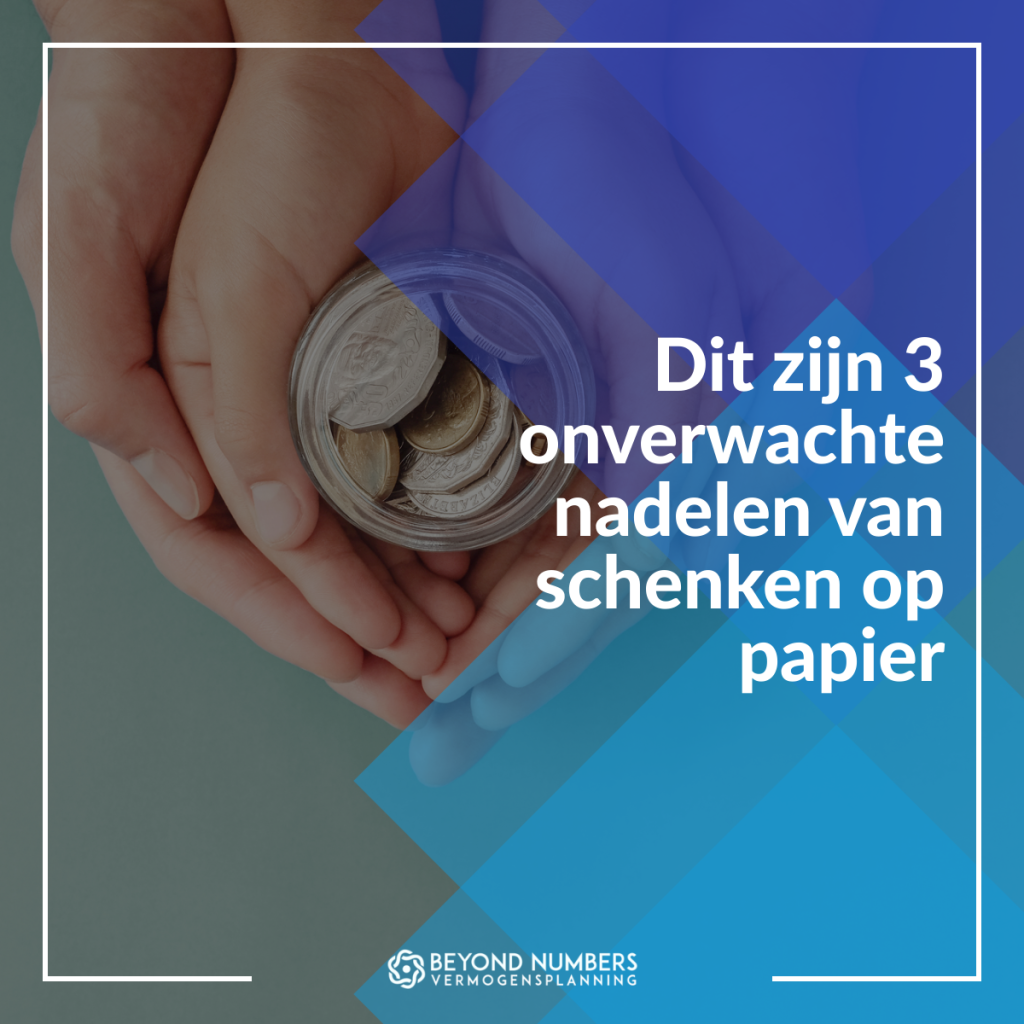Donating on paper: how it works
It is so logical to think that when you donate, an amount must be posted from one account to another.
One donates – and becomes poorer.
The other receives – and becomes richer.
Simple, right?
But imagine if you wanted to donate but still:
Want to keep control of the money, because you don’t have confidence that your child will handle it well
Want to keep making decisions about the money yourself, because you have certain thoughts about how you want to save or invest the money
Don’t actually want to lose the money, because it gives you peace of mind that the money is simply in the account
Is that possible?
Does this exist?
The answer is a resounding YES.
How?
With the donation on paper.
Because with gifting on paper you can donate and at the same time keep all the strings in hand over the money. How?
You donate the money to the child. And you immediately borrow it back!
Here’s an example:
You have € 150,000 in the savings account and no further assets
You want to donate € 25,000 on paper to the child
You donate € 25.000,-
You can borrow it back immediately (that works easily, see info at “Disadvantage #1”, below)
The donation on paper is a fact
You still have € 150,000 on the account
But also a debt to your child of € 25,000
So you have become € 25,000 poorer
If something is too good to be true, it probably is (they often say).
And with the donation on paper, it’s no different. Because here too there are disadvantages. Below we list them:
Disadvantage #1: Donating on paper MUST go through the notary
The law requires that a donation must be recorded on paper in a notarial deed.
The donation must also be made personally on paper. This means that the donation may not be made via a power of attorney, for example.
So a visit to the notary must be made. And no, a statement drawn up by the auditor is not valid.
Do you not meet this requirement?
Then the donation – on the death of the donor – is invalid.
This means that after the death, the gift is, as it were, added to the inheritance, so that inheritance tax is (still) due on it.
And that’s a shame. Because the donation on paper that you make now does not have to be subject to inheritance tax on death if you follow the rules. And that can easily result in 10% or even 20% inheritance tax savings on the donation.
But… If the donation on paper has not gone through the notary, it will not work in the event of death. Then inheritance tax is still due on it. This means that it is legally assumed that the donation did not take place.
That is annoying because gift tax may have already been paid on it.
Not so convenient.
There is still a big advantage to the notary visit.
Because of the notarial deed, the amounts do not have to be literally booked back and forth from parent to child.
Because the notarial deed has been drawn up, a debt automatically arises with the parent and the claim with the child in the amount of the gift on paper.
The money does not even have to leave your account, while the amount is still a donation on paper.
That is, of course, a pleasant side effect.
But it’s not all hallelujah.
There is still a potential downside to the child’s debt.
And we’ll go into that below.
Disadvantage #2: An interest MUST be paid when donating on paper (and this is not tender)
You owe a debt to the child. As for example above in the example of € 25,000,-.
And you pay interest on debt, which is as old as the road to Rome.
How much interest then?
You pay an interest rate of 6%!
And this interest per year is a hard limit set by law.
In fact, at an interest rate of 5.99%, the construction does not work.
Small example.
Suppose a donation on paper of € 25,000 is made, this means that € 1,500 (6% x € 25,000) will have to be paid to the child every year.
Every year.
No exception.
The interest of 6% must actually be paid (every year) and this must also be demonstrated. For example, with bank statements.
Do you forget a year?
Then the tax authorities could still punish this, so that inheritance tax must still be paid on the donation after the death of the donor.
Is there an advantage to this interest?
Sure.
Because the interest you pay is not a donation. After all, it is an interest on the debt to the child. The interest income that the child receives therefore does not have to be taxed.
Is it actually a disadvantage, this interest?
No, not necessarily.
Unless the parent can no longer pay the interest at some point.
Because imagine donating € 100,000 to three children. Then this means that € 6,000 interest will have to be paid annually to each child.
And that x 3. Or a total of € 18,000,-.
Per year.
As long as you live.
Before you start donating on paper, it is therefore important to properly overcome this potential disadvantage.
After all, it cannot be the intention that the donor’s own financial situation is jeopardized because the donor’s interest charges can no longer be paid.
And that brings us to the third disadvantage of the donation on paper.
Disadvantage #3: The new box 3 tax from 2023
Since January 1, 2023, the box 3 tax has changed.
And for the donation on paper, the calculation of the possible advantage or disadvantage has not become easier.
Why?
Because it depends entirely on the personal situation.
A rule of thumb for new donations on paper is:
For new donations on paper, the tax burden at family level may become up to 1.17% more unfavourable compared to before 2023. The parent has about 0.8% benefit from the debt and the child pays 1.97% tax on the claim.
An example to make it clearer.
Suppose a donation of € 100,000 has been made on paper,-, then the benefit of the debt for the parent is approximately € 800 per year (0.8% x € 100,000). The disadvantage for the child is then € 1,970 per year (1.97% per year). On the other hand, the child can of course pay this tax setback from the interest income of € 6,000 (6% x € 100,000). Moreover, the child also has the advantage of saving inheritance tax in the long term.
All in all, it is therefore good to also list the tax effects.
Because it is quite possible that taxation will look very different. And that depends on the parent’s and child’s own total financial situation.
Donating on paper: disadvantages or advantages?
Advantages.
Absolutely.
Donating on paper can be fiscally attractive, because it can reduce the inheritance (and therefore also the inheritance tax to be paid).
In addition, you can transfer “free” interest to the child, without paying tax on this.
A donation on paper must – for the success of this tax trick – be designed in the right way. For example, the donation must be recorded in a notarial deed and the donor must appear personally at the notary.
Also, 6% interest per year must actually be paid to the endowed person.
The tax authorities may ask for supporting documents, so keep all bank statements showing the interest payment.
If you meet these conditions and can pay the interest costs annually, then the donation on paper is a pleasant way to transfer assets. After all, you keep control of the assets and you can decide for yourself what you are going to do with the assets.
There is still one question you have to answer.
Because who donates?
Because if you’re a married couple, who donates?
Are they both spouses?
Or is it either?
And can you, as a parent, donate 1x or even 2x to child (without paying extra tax)?
To answer these questions, we share a free PDF:
“How to avoid the #1 donation mistake as a couple (and that’s not obvious)”
All you have to do to receive this free PDF is enter your first name and email address below:
After entering your first name and e-mail address, you will receive the free PDF about:
“How to avoid the #1 donation mistake as a couple (and that’s not obvious)” directly via email.
So that you always make the right decision about the donation on paper.
And there will be no surprises.
That’s nice.
Nevertheless?
Thanks for reading.
Greet
Ronald Sier
Eigenaar en vermogensplanner Beyond Numbers



